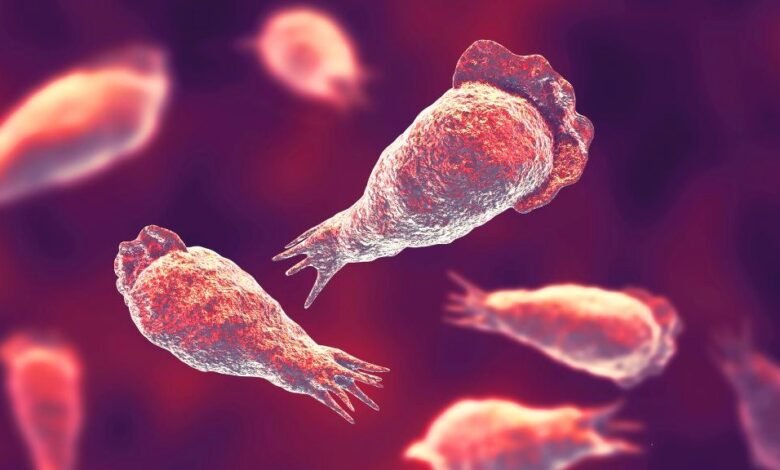Fowleri: Silent Threat in Waters 2023

Protect yourself from Fowleri, the silent threat in the waters in 2023. Learn about the symptoms, effects, and preventive measures of this rare but potentially fatal amoeba. Stay informed, stay safe, and enjoy water activities with awareness and caution.
Fowleri, commonly known as the “brain-eating amoeba,” is a rare amoeba that can cause a severe infection in the brain called primary amebic meningoencephalitis (PAM). PAM occurs when contaminated water enters the nose, allowing the amoeba to travel to the brain. While PAM is extremely rare, it can be fatal, and symptoms include severe headache, fever, nausea, and altered mental status
In recent years Fowleri, scientifically known as Naegleria fowleri, has emerged as a concern for water enthusiasts worldwide. This amoeba resides in warm freshwater environments such as lakes, hot springs, and poorly maintained swimming pools. Though rare, Fowleri infections can be fatal, making it essential to understand its characteristics and take appropriate precautions.
Read More: Which Is Better For Hydration: Water Or Sports Drinks?
Understanding Fowleri
Fowleri is a single-celled organism commonly found in warm freshwater bodies. It belongs to the group of amoebae known as free-living amoebae (FLA). While harmless when ingested, Fowleri poses a threat when it enters the body through the nose, typically while swimming or diving. Once inside, it can travel to the brain, causing a severe infection known as primary amebic meningoencephalitis (PAM).
Fowleri is named after the scientist who first discovered it, Dr. Malcolm Douglas Fowle. It was identified as a pathogenic amoeba in the 1960s, and since then, it has been the focus of research and concern due to its potentially devastating effects on human health.
This amoeba thrives in warm freshwater environments with temperatures above 25°C (77°F). It can be found in various bodies of water, including lakes, rivers, hot springs, and poorly maintained swimming pools. Fowleri amoebae feed on bacteria and other microorganisms present in the water.
Symptoms and Effects

The symptoms and effects of a Fowleri infection can be severe and rapidly progressive. It’s important to be aware of these symptoms to seek prompt medical attention if needed. Here is a closer look at the symptoms and effects associated with Fowleri infections:
Early Symptoms
The initial symptoms of a Fowleri infection are often similar to those of common ailments such as flu or bacterial meningitis. These early symptoms may include:
- Headaches: Persistent and severe headaches that may worsen over time.
- Fever: Elevated body temperature accompanied by general malaise.
- Nausea: Feeling of queasiness and an urge to vomit.
- Stiff Neck: Difficulty or discomfort when moving the neck due to stiffness.
Progression of Symptoms
As the infection progresses, more severe symptoms may manifest. These symptoms can be indicative of the progression of primary amebic meningoencephalitis (PAM). They may include:
- Seizures: Uncontrolled and abnormal electrical activity in the brain, leading to convulsions.
- Hallucinations: Perceiving things that are not actually present, including auditory or visual hallucinations.
- Changes in Mental Status: Confusion, disorientation, and difficulty in maintaining focus or attention.
- Loss of Consciousness: In advanced stages, the infected individual may enter a coma or a state of unconsciousness.
Rapid Deterioration
Fowleri infections can progress rapidly, with the symptoms worsening within a matter of days. Due to the aggressive nature of the infection, seeking immediate medical attention is crucial to maximize the chances of treatment success.
Transmission and Prevention
Fowleri infections occur when contaminated water enters the nasal passages. Activities such as diving, water skiing, or jumping into warm freshwater bodies carry a higher risk. It’s important to note that Fowleri infections cannot occur by drinking contaminated water or by contact with amoeba-infected individuals. To minimize the chances of infection, it is crucial to adhere to the following preventive measures:
- Avoid diving or jumping into warm freshwater environments with unknown water quality. Pay attention to warning signs or advisories.
- Use nose clips or hold your nose shut when participating in water activities in warm freshwater bodies.
- Ensure swimming pools and hot tubs are properly maintained and disinfected according to recommended guidelines.
- If using a neti pot for nasal irrigation, only use sterile or previously boiled water. It’s essential to follow proper hygiene practices to prevent contamination.
Safety Measures for Water Activities
While Fowleri infections are rare, it’s prudent to adopt safety measures to protect yourself and your loved ones. By following these guidelines, you can enjoy water activities while minimizing the risk:
- Choose well-maintained swimming pools or adequately treated water bodies for recreational activities. Public swimming facilities often adhere to strict maintenance and disinfection protocols.
- Teach children not to submerge their heads or sniff water while swimming. Encourage them to wear nose clips for added protection.
- Encourage regular breaks and ensure individuals stay hydrated to prevent accidental water inhalation.
- Always supervise children during water activities to prevent any mishaps and provide immediate assistance if needed.
Read More: Boost Mental Health Naturally in 2023
Conclusion
In conclusion, Fowleri, the silent threat in waters, is a rare but potentially fatal amoeba that can cause primary amebic meningoencephalitis (PAM). Understanding its characteristics, transmission, and symptoms is crucial for prevention. By following preventive measures such as avoiding unknown water quality, using nose clips, and maintaining proper water sanitation, we can minimize the risk of Fowleri infections. Prompt medical attention is vital if symptoms occur after exposure to warm freshwater. Stay informed, stay safe, and enjoy water activities with awareness and caution.
FAQs
Is Fowleri infection treatable?
Fowleri infections are challenging to treat, and prompt medical attention is crucial for a chance of survival. Early diagnosis and administration of certain medications may improve the chances of recovery.
Can Fowleri infections occur in saltwater bodies?
No, Fowleri thrives in warm freshwater environments and does not pose a threat in saltwater bodies such as oceans or seas.
Are there any preventive measures for Fowleri infections?
Yes, practicing good hygiene, avoiding warm freshwater with unknown quality, and using nose clips during water activities are effective preventive measures.
Is it safe to swim in pools treated with chlorine?
Chlorine-treated swimming pools with appropriate maintenance and disinfection measures can significantly reduce the risk of Fowleri infections.
What is the mortality rate of Fowleri infections?
Unfortunately, Fowleri infections have a high mortality rate, with the majority of cases resulting in fatalities.







